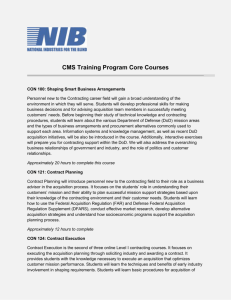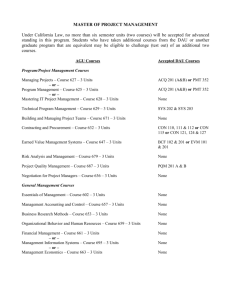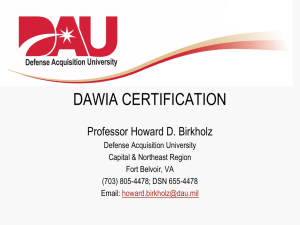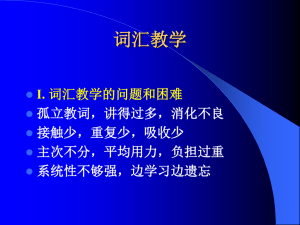acquisition certifications
advertisement
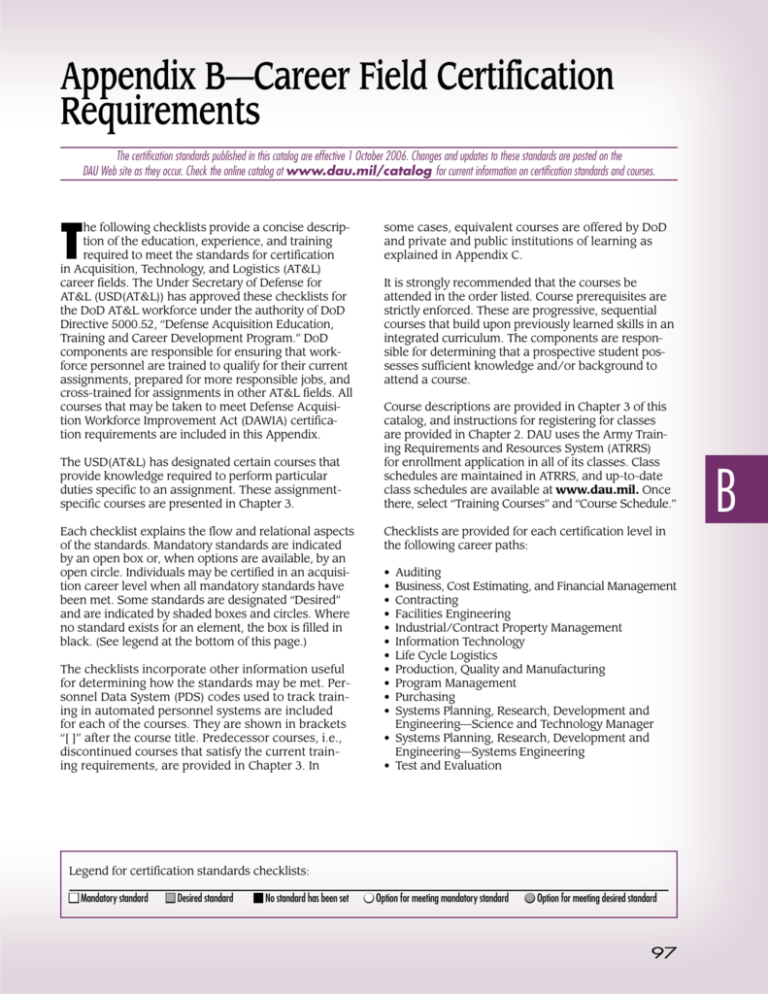
Appendix B—Career Field Certification Requirements The certification standards published in this catalog are effective 1 October 2006. Changes and updates to these standards are posted on the DAU Web site as they occur. Check the online catalog at www.dau.mil/catalog for current information on certification standards and courses. T he following checklists provide a concise description of the education, experience, and training required to meet the standards for certification in Acquisition, Technology, and Logistics (AT&L) career fields. The Under Secretary of Defense for AT&L (USD(AT&L)) has approved these checklists for the DoD AT&L workforce under the authority of DoD Directive 5000.52, “Defense Acquisition Education, Training and Career Development Program.” DoD components are responsible for ensuring that workforce personnel are trained to qualify for their current assignments, prepared for more responsible jobs, and cross-trained for assignments in other AT&L fields. All courses that may be taken to meet Defense Acquisition Workforce Improvement Act (DAWIA) certification requirements are included in this Appendix. The USD(AT&L) has designated certain courses that provide knowledge required to perform particular duties specific to an assignment. These assignmentspecific courses are presented in Chapter 3. Each checklist explains the flow and relational aspects of the standards. Mandatory standards are indicated by an open box or, when options are available, by an open circle. Individuals may be certified in an acquisition career level when all mandatory standards have been met. Some standards are designated “Desired” and are indicated by shaded boxes and circles. Where no standard exists for an element, the box is filled in black. (See legend at the bottom of this page.) The checklists incorporate other information useful for determining how the standards may be met. Personnel Data System (PDS) codes used to track training in automated personnel systems are included for each of the courses. They are shown in brackets “[ ]” after the course title. Predecessor courses, i.e., discontinued courses that satisfy the current training requirements, are provided in Chapter 3. In some cases, equivalent courses are offered by DoD and private and public institutions of learning as explained in Appendix C. It is strongly recommended that the courses be attended in the order listed. Course prerequisites are strictly enforced. These are progressive, sequential courses that build upon previously learned skills in an integrated curriculum. The components are responsible for determining that a prospective student possesses sufficient knowledge and/or background to attend a course. Course descriptions are provided in Chapter 3 of this catalog, and instructions for registering for classes are provided in Chapter 2. DAU uses the Army Training Requirements and Resources System (ATRRS) for enrollment application in all of its classes. Class schedules are maintained in ATRRS, and up-to-date class schedules are available at www.dau.mil. Once there, select “Training Courses” and “Course Schedule.” Checklists are provided for each certification level in the following career paths: • • • • • • • • • • • Auditing Business, Cost Estimating, and Financial Management Contracting Facilities Engineering Industrial/Contract Property Management Information Technology Life Cycle Logistics Production, Quality and Manufacturing Program Management Purchasing Systems Planning, Research, Development and Engineering—Science and Technology Manager • Systems Planning, Research, Development and Engineering—Systems Engineering • Test and Evaluation Legend for certification standards checklists: N Mandatory standard N Desired standard N No standard has been set L Option for meeting mandatory standard L Option for meeting desired standard 97 B Auditing The certification standards published in this catalog are effective 1 October 2006. Changes and updates to these standards are posted on the DAU Web site as they occur. Check the online catalog at www.dau.mil/catalog for current information on certification standards and courses. T he mandatory education, experience, and training requirements for the Auditing career field apply to contract auditors. Persons in this career field perform contract auditing, accounting, and financial advisory services to DoD and other government agencies in negotiation, administration, and settlement of contracts and subcontracts. Duties include evaluating information about contractor economic assertions, Level I N EDUCATION – Meet one of the following criteria: L A baccalaureate degree in accounting L A baccalaureate degree in a related field, such as business administration or finance, that included or was supplemented by 24 semester hours in accounting L At least 4 years of experience in accounting L An equivalent combination of accounting experience, college education, and training N EXPERIENCE: N 1 year of contract auditing experience N (Desired) Accounting/auditing work experience in industry or public accounting N TRAINING N AUD 1130 Technical Indoctrination [PC6] Level II N EDUCATION N Entry below GS-9: Complete Level I requirements N Entry at GS-9: Complete Level I requirements and one of the following: L 2 full years of graduate education leading to a master’s degree in accounting, auditing, or related field such as business administration or finance L 1 full year of professional accounting, auditing, or related experience N (Desired) Beginning graduate studies leading to a master’s degree in accounting, business administration, management, or a related field N (Desired) Professional certification (CPA, CMA, CIA, CISA) N EXPERIENCE N 2 years of contract auditing experience of increasing complexity and responsibility N (Desired) Experience performing increasingly comparing those assertions to established criteria, and reporting the results to interested third parties. Some reasons for audits include proposal submissions, incurred cost, compliance with the “Truth in Negotiations Act,” compliance with Cost Accounting Standards, contract terminations, claims for abnormal conditions, contractor financial condition, and contractor systems and operations. N TRAINING N Complete one of the following courses: L AUD 1320 Intermediate Contract Auditing [JR7] L AUD 4120 Statistical Sampling [QP0] N (Desired) Any of the following courses: * L AUD 6220 Auditor Interview and Interpersonal Reactions [PA3] L AUD 6240 Oral Presentation Workshop [PA4] L AUD 5653 Computer Assisted Audit Techniques L AUD 1541 Cost Accounting Standards L AUD 5614 Fundamentals of Auditing Information Systems L AUD 6115 Effective Report Writing [PAG] Level III N EDUCATION N Complete Level II requirements N (Desired) Master’s degree in accounting, busi- ness administration, management, or a related field N EXPERIENCE N 3 years of contract auditing experience and attainment of position beyond senior auditor N (Desired) Assignments in a variety of organizational settings N TRAINING N No mandatory contract audit training for non- supervisors at the advanced contract auditor level N Desired) Complete one or both of the following courses: L AUD 4035 Quantitative Methods Refresher L ACQ 101 Fundamentals of Systems Acquisition Management [BU5] complex audits for normal position progression and with increasing independence *For information on auditing courses not listed in Chapter 3 of this catalog, contact the Defense Contract Audit Institute at (901) 325-6100. 98 Business, Cost Estimating, and Financial Management The certification standards published in this catalog are effective 1 October 2006. Changes and updates to these standards are posted on the DAU Web site as they occur. Check the online catalog at www.dau.mil/catalog for current information on certification standards and courses. T his career field encompasses all aspects of business and financial management. It includes cost estimating and analysis, financial planning, formulating financial programs and budgets, budget analysis and execution, and earned value management. As advisors to commanders, program executive officers, program managers, or other acquisition decision makers, members of this career field are responsible for business financial management of defense acquisition programs in direct support of the defense acquisition process. Level I Level III N EDUCATION N EDUCATION N (Desired) Baccalaureate degree with 24 (Desired) Baccalaureate degree N EXPERIENCE 1 year of acquisition experience in business, cost estimating, or financial management N TRAINING N ACQ 101 Fundamentals of Systems Acquisition Management [BU5] semester hours in accounting, business finance, law, contracts, purchasing, economics, industrial management, marketing, quantitative methods, or organization and management N (Desired) Master’s degree N EXPERIENCE N 4 years of acquisition experience in business, N Complete two of the following courses: L BCF 101 Fundamentals of Cost Analysis [Q1A] cost estimating, or financial management L BCF 102 Fundamentals of Earned Value N (Desired) An additional 4 years of acquisition Management [Q1B] experience in business, cost estimating, or financial management L BCF 103 Fundamentals of Business Finan- N TRAINING cial Management [PGC] Level II BCF 301 Business, Cost Estimating, and Financial Management Workshop [BZF] N EDUCATION (Desired) Baccalaureate degree N EXPERIENCE N 2 years of acquisition experience in business, In addition to certification requirements, the Assignment-specific Courses or Continuous Learning Modules listed on the following page are highly recommended specifically for the positions named. cost estimating, or financial management N (Desired) An additional 2 years of experience in business, cost estimating, or financial management N TRAINING N ACQ 201 (Parts A & B) Intermediate Systems Acquisition [JHJ & JHK] N BCF 205 Contractor Business Strategies [Q2A] N Complete ONE of the following courses (not previously taken at Level I): L BCF 101 Fundamentals of Cost Analysis [Q1A] L BCF 102 Fundamentals of Earned Value Management [Q1B] L BCF 103 Fundamentals of Business Financial Management [PGC] N Complete ONE of the following courses (related to specific job duties): L BCF 203 Intermediate Earned Value Management [Q2G] L BCF 204 Intermediate Cost Analysis [Q2B] L BCF 211 Acquisition Business Management [PGD] N Mandatory standard N Desired standard N No standard has been set L Option for meeting mandatory standard L Option for meeting desired standard 99 B Business, Cost Estimating, and Financial Management (Continued) Cost Estimators Assignment-specific DAU Courses BCF 206 Cost Risk Analysis [Q2C] BCF 207 Economic Analysis [Q2D] BCF 208 Software Cost Estimating [Q2E] BCF 215 Operating and Support Cost Analysis [Q2H] Online DAU Continuous Learning Module(s) Cost Analysis (CLB 007) EVM Analysts Assignment-specific DAU Courses BCF 203 Intermediate Earned Value Management [Q2G] BCF 262 EVMS Validation and Surveillance [JHX] Online Continuous Learning Modules Introduction to Earned Value Management (CLB 016) Performance Management Baseline (CLB 017) Earned Value and Financial Management Reports (CLB 018) Estimate at Completion (CLB 019) Baseline Maintenance (CLB 020) EVM Community of Practice Tutorials (no CLP credit) Fundamentals of EVM 1 – Basics Fundamentals of EVM 2 – Performance Measurement Baseline Fundamentals of EVM 3 – Reports Fundamentals of EVM 4 – Estimate at Completion Fundamentals of EVM 5 – Baseline Maintenance Revised DoD EVM Policy – March 2005 DoD Integrated Program Management Model 100 Budget/Program/Financial Management Analysts Assignment-specific DAU Courses BCF 209 Acquisition Reporting for MDAPs [Q2F] BCF 229 Acquisition Reporting for MAIS [BE6] Online DAU Continuous Learning Modules Acquisition of Services (CLC 014) Acquisition Reporting Concepts and Policy Requirements for APB, DAES, and SAR (CLB 014) CAIV (CLB 012) Contract Source Selection (CLC 007) Contract Terminations (CLC 006) Contracting Officers Representative (COR) with a Mission Focus (CLC 106) Cost Analysis (CLB 007) Cost Estimating (CLM 016) Item Unique Identification (CLM 200) Proper Use of Non-DoD Contracts (CLC 010) Simplified Acquisition Procedures (CLC 005) Contracting The certification standards published in this catalog are effective 1 October 2006. Changes and updates to these standards are posted on the DAU Web site as they occur. Check the online catalog at www.dau.mil/catalog for current information on certification standards and courses. A s business advisors, contracting specialists create effective, efficient, and proper business arrangements, have a strategic focus on acquisition, and leverage DoD spending to use taxpayers’ money prudently based upon customers’ needs. perform procedures involving the procurement of supplies and services; construction, research, and development; acquisition planning; cost and price analysis; solicitation and selection of sources; preparation, negotiation, and award of contracts through sealed bidding or negotiation procedures; all phases of contract administration; and termination or closeout of contracts. Individuals are required to have knowledge of the legislation, policies, regulations, and methods used in contracting, as well as knowledge of business and industry practices, sources of supply, cost factors, cost and price analysis techniques, and general requirements characteristics. The Contracting career field includes the positions of contract negotiator, contract specialist, contract administrator, contract termination specialist, contract price and/or cost analyst, procuring contracting officer, administrative contracting officer, termination contracting officer, and procurement analyst. These individuals develop, manage, supervise, or Level I N N TRAINING N CON 214 Business Decisions for Contracting [JHP] N CON 215 Intermediate Contracting for Mission EDUCATION 1 N Baccalaureate degree N At least 24 semester hours among accounting, Support [JHQ] law, business, finance, contracts, purchasing, economics, industrial management, marketing, quantitative methods, and organization and management N CON 216 Legal Considerations in Contracting [JHR] N CON 217 Cost Analysis and Negotiation Techniques [JHS] N EXPERIENCE N CON 218 Advanced Contracting for Mission N TRAINING N CON 100 Shaping Smart Business Arrange- N 2 Electives 2 Support [JHT] 1 year of contracting experience N N N N N ments [JHE] CON 110 Mission Support Planning [BE0] CON 111 Mission Planning Execution [BE8] CON 112 Mission Performance Assessment [BE9] CON 120 Mission Focused Contracting [JHN] 2 1 Elective 2 Level II N EDUCATION1 N Baccalaureate degree N At least 24 semester hours among accounting, law, business, finance, contracts, purchasing, economics, industrial management, marketing, quantitative methods, and organization and management N (Desired) Graduate studies in business administration or procurement N EXPERIENCE N 2 years of contracting experience N (Desired) An additional 2 years of contracting experience The conversion matrix on the following page will assist individuals transitioning from previous Level II Contracting training requirements to current training requirements. Level III N EDUCATION1 N Baccalaureate degree N At least 24 semester hours among accounting, law, business, finance, contracts, purchasing, economics, industrial management, marketing, quantitative methods, and organization and management N (Desired) Master’s degree in business administration or procurement N EXPERIENCE N 4 years of contracting experience N (Desired) An additional 4 years of contracting experience N TRAINING N CON 353 Advanced Business Solutions for Mission Support [JHI] N 2 Electives2 N (Desired) 2 weeks of management and leadership training (Not currently provided by DAU. See your local training support office.) 1See 10 U.S.C. 1724 (provides for limited exceptions). 2As agreed to by the supervisor, electives may be any training opportunities related to the employee’s job or necessary for career development or for cross training. Electives may include no-cost distance learning or other training opportunities, assignment-specific courses funded by DAU/DACM, or other training opportunities funded by the student’s organization. N Mandatory standard N Desired standard N No standard has been set L Option for meeting mandatory standard L Option for meeting desired standard 101 B Contracting (Continued) CONTRACTING LEVEL II TRAINING REQUIREMENTS Transition Matrix If completed 102 Required to take Recommended to take CON 202 CON 216, 217, & 218 CON 214 CON 204 CON 214, 215, 216, & 218 CON 217 CON 210 CON 214, 215, 217, & 218 CON 202 & 204 CON 216 & 218 CON 214 & 217 CON 202 & 210 CON 217 & 218 CON 214 CON 204 & 210 CON 214, 215, & 218 CON 217 Facilities Engineering The certification standards published in this catalog are effective 1 October 2006. Changes and updates to these standards are posted on the DAU Web site as they occur. Check the online catalog at www.dau.mil/catalog for current information on certification standards and courses. T he Facilities Engineering career field encompasses a variety of professional individuals with diverse skills focused on the design, construction, and life cycle maintenance of military installations, facilities, civil works projects, airfields, roadways, and ocean facilities. It involves all facets of life cycle management from planning through disposal, including design, construction, environmental protection, base operations and support, housing, real estate, and real property maintenance. Additional duties include advising or assisting commanders and acting as, or advising, program managers and other officials as necessary in executing all aspects of their responsibilities for facility management and the mitigation/elimination of environmental impact in direct support of the defense acquisition process. Level I Level III N EDUCATION N EDUCATION N (Desired) Baccalaureate degree in engineering, (Desired) Baccalaureate degree in engineering, architecture, physics, chemistry, mathematics, community planning, business, or related fields N EXPERIENCE 1 year of acquisition experience in facilities engineering N TRAINING ACQ 101 Fundamentals of Systems Acquisition Management [BU5] Level II N EDUCATION N (Desired) Baccalaureate degree in engineering, architecture, physics, chemistry, mathematics, community planning, business, or related fields N (Desired) 9 semester credit hours selected from accounting, business finance, law, economics, industrial management, quantitative methods, or organization and management N EXPERIENCE N 2 years of acquisition experience in facilities engineering N (Desired) An additional 2 years of acquisition experience in facilities engineering N TRAINING N ACQ 101 Fundamentals of Systems Acquisition Management [BU5] (if not completed at Level I) N FE 201 Intermediate Facilities Engineering [JHM] N (Desired) DAU Level I or II courses in one of the following career fields: Contracting; Information Technology; Life Cycle Logistics; Production, Quality and Manufacturing; Program Management; Systems Planning, Research, Development and Engineering; or Test and Evaluation. N Mandatory standard N Desired standard N No standard has been set architecture, physics, chemistry, mathematics, community planning, business, or related fields N (Desired) Advanced degree from an accredited institution of higher learning in engineering, physics, chemistry, operations research, community planning, management, business, public administration or related fields N (Desired) 12 semester credit hours selected from accounting, business finance, law, economics, industrial management, quantitative methods, or organization and management N EXPERIENCE N 4 years of acquisition experience in facilities engineering N (Desired) 4 additional years of experience in acquisition positions of increasing responsibility and complexity N TRAINING N FE 301 Advanced Facilities Engineering is in development and will be available in the second quarter of FY07. Check the online catalog at www.dau.mil/catalog for updates. N (Desired) DAU Level II or III courses in one of the following career fields: Contracting; Information Technology; Life Cycle Logistics; Production, Quality and Manufacturing; Program Management; Systems Planning, Research, Development and Engineering; or Test and Evaluation. L Option for meeting mandatory standard L Option for meeting desired standard 103 B Industrial/Contract Property Management The certification standards published in this catalog are effective 1 October 2006. Changes and updates to these standards are posted on the DAU Web site as they occur. Check the online catalog at www.dau.mil/catalog for current information on certification standards and courses. T his career field includes the industrial property management specialist, property administrator, industrial plant clearance specialist, plant clearance officer, and contract and industrial specialists (if assigned contract property management responsibilities). Individuals in this career field perform Government contract property oversight and surveillance of life-cycle processes and their commensurate outcomes for Government-owned property in the possession of contractors and, in some instances, Governmentowned contractor-operated plants. This includes developing policies and procedures for contract property; providing guidance, counsel, and direction to Government and contractor managers and technicians relating to regulatory and contractual require- Level I N EDUCATION (Desired) Baccalaureate degree or at least 24 semester hours among accounting, law, busness, finance, contracts, purchasing, economics, industrial management, marketing, quantitative methods, and organization and management N EXPERIENCE 1 year of property management experience N TRAINING N CON 100 Shaping Smart Business ArrangeN N N N N ments [JHE] CON 110 Mission Support Planning [BE0] CON 111 Mission Planning Execution [BE8] CON 112 Mission Performance Assessment [BE9] IND 100 Contract Property Administration and Disposition Fundamentals [BZP] IND 103 Contract Property Systems Analysis Fundamentals [BRL] Level II N EDUCATION (Desired) Baccalaureate degree or at least 24 semester hours among accounting, law, busness, finance, contracts, purchasing, economics, industrial management, marketing, quantitative methods, and organization and management N EXPERIENCE 2 years of experience in an industrial property management position ments for managing Government property; participating in pre-award surveys and post-award reviews; reviewing contracts assigned for property administration; evaluating a contractor’s property management system; and developing and applying property systems analysis programs to assess the effectiveness of contractors’ Government property management systems. These functions are normally performed by the contract administration team, and as required by Parts 42.3, and 45, of the Federal Acquisition Regulation (FAR) and Part 245 of the Department of Defense FAR Supplement (DFARS). N TRAINING N CON 214 Business Decisions for Contracting [JHP] N CON 216 Legal Considerations in Contracting [JHR] N CON 217 Cost Analysis and Negotiation Techniques [JHS] N IND 200 Intermediate Contract Property Administration and Disposition [BZQ] N 1 Elective* Level III N EDUCATION (Desired) Baccalaureate degree or at least 24 semester hours among accounting, law, busness, finance, contracts, purchasing, economics, industrial management, marketing, quantitative methods, and organization and management N EXPERIENCE N 4 years of experience in industrial property management positions of increasing responsibility and complexity N (Desired) 4 additional years of experience in industrial property management N TRAINING N CON 353 Advanced Business Solutions for Mission Support [JHI] N 2 Electives* INDUSTRIAL/CONTRACT PROPERTY MANAGEMENT Transition Matrix If completed Required to take CON 202 CON 216 & 217 CON 210 CON 214 & 217 *As agreed to by the supervisor, electives may be any training opportunities related to the employee’s job or necessary for career development or for cross training. Electives may include no-cost distance learning or other training opportunities, assignment-specific courses funded by DAU/DACM, or other training opportunities funded by the student’s organization. 104 Information Technology The certification standards published in this catalog are effective 1 October 2006. Changes and updates to these standards are posted on the DAU Web site as they occur. Check the online catalog at www.dau.mil/catalog for current information on certification standards and courses. T his career field includes computer scientists, information technology management specialists, computer engineers, telecommunications managers, etc., who directly support the acquisition of information technology. This may include hardware, software, or firmware products used to create, record, produce, store, retrieve, process, transmit, disseminate, present, or display data or informa- tion. The employee identifies requirements; writes and/or reviews specifications; identifies costs; obtains resources (manpower, funding, and training); supports portfolio management, information assurance, and IT-architecture-related activities; and tests, evaluates, plans, obtains, and manages life cycle development and support (operations, maintenance, and replacement). Level I N EXPERIENCE N 2 years of acquisition experience, at least 1 N EDUCATION year of this experience must be in information technology N(Desired) An additional 2 years of information technology acquisition experience, preferably in a program office or similar organization (Desired) Baccalaureate degree, preferably with a major in computer science, management information systems, business administration, or a related field N EXPERIENCE N TRAINING N ACQ 201 (Parts A & B) Intermediate Systems 1 year of acquisition experience in information technology N TRAINING (if student was enrolled in these courses prior to 15 Nov 05) N ACQ 101 Fundamentals of Systems Acquisition Management [BU5] N IRM 101 Basic Information Systems Acquisition [JHD] N SAM 101 Basic Software Acquisition Management [JHB] Acquisition [QN5] N SAM 201 Intermediate Software Acquisition Management [JHC] Level III N TRAINING (requirements after 15 Nov 05) N ACQ 101 Fundamentals of Systems Acquisition Management [BU5] N IRM 101 Basic Information Systems Acquisition [JHD] N EDUCATION (Desired) Master’s degree, preferably with a major in computer science, management information systems, business administration, or a related field N EXPERIENCE N 4 years of information technology or software- Note: Both IRM 101 and SAM 101 are required if the courses were completed prior to15 Nov 05. Only IRM 101 is required if the course was completed after 15 Nov 05. intensive systems acquisition experience N (Desired) 4 additional years of information technology acquisition experience N TRAINING N IRM 304 Advanced Information Systems Level II Acquisition [BZE] (effective 1 Feb 07) N EDUCATION (Desired) Master’s degree, preferably with a major in computer science, management information systems, business administration, or a related field N Mandatory standard Acquisition [JHJ & JHK] N IRM 201 Intermediate Information Systems N Desired standard N No standard has been set N SAM 301 Advanced Software Acquisition Management [BU9] N (Desired) PMT 352 (Parts A & B) Program Management Office Course [BZH & BZJ] L Option for meeting mandatory standard L Option for meeting desired standard 105 B Life Cycle Logistics The certification standards published in this catalog are effective 1 October 2006. Changes and updates to these standards are posted on the DAU Web site as they occur. Check the online catalog at www.dau.mil/catalog for current information on certification standards and courses. T he Life Cycle Logistics career field includes professionals responsible for planning, development, implementation, and management of an effective and affordable weapons, materiel, or information systems support strategies. Life cycle logisticians perform a principal joint and/or Component logistics role during the acquisition and operational phases of the system life cycle to: (1) ensure product support strategies meet the program goals for operational effectiveness and readiness; (2) ensure supportability requirements are addressed consistently with cost, schedule, and Level I N EDUCATION (Desired) Baccalaureate degree in a technical, scientific, or managerial field EXPERIENCE 1 year of acquisition experience in life cycle logistics TRAINING ACQ 101 Fundamentals of Systems Acquisition Management [BU5] LOG 101 Acquisition Logistics Fundamentals [JR1] LOG 102 Systems Sustainment Management Fundamentals [JHF] Additional job competency modules are discretionary and completed based on DoD Component preferences or agreement between employees and supervisors N Performance Based Logistics (PBL) (CLL 011) N N N N N N N N N 106 continuous learning module Designing for Supportability in DoD Systems (CLL 008) continuous learning module DMSMS Fundamentals (CLL 201) continuous learning module Introduction to Lean Enterprise Concepts (CLE 004) continuous learning module Enterprise Integration (CLE 006) continuous learning module Budget Policy (CLB 011) continuous learning module Contracting for the Rest of Us (CLC 011) continuous learning module Configuration Management (CLL 016) continuous learning module (to be available during FY07) Joint Systems Integrated Support Strategies (CLL 014) continuous learning module Business Case Analysis (CLL 015) continuous learning module performance; (3) perform an integral role in systems engineering to ensure supportability considerations are implemented during systems design; and (4) plan and develop performance-based logistics initiatives as the preferred approach to product support. Life cycle logisticians ensure the integration of all support elements to maximize deployability, supportability, and mobility of the system throughout the program life cycle. They can work directly in a program management office, in support of the program manager, or in other supporting logistics activity offices. N Systems Engineering Fundamentals (CLE 017) continuous learning module (to be available during FY07) N Software Support (CLE 018) continuous learning module (to be available during FY07) Level II N EDUCATION N (Desired) Baccalaureate degree in a technical, scientific, or managerial field N (Desired) Completion of a certificate program in Systems Design and Operational Effectiveness (SDOE) or similar systems engineering/ technical education N (Desired) Completion of a certificate program in Business Administration to include Supply Chain Management EXPERIENCE 2 years of acquisition experience in life cycle logistics N (Desired) An additional 2 years of life cycle logistics experience in support of DoD weapons/materiel systems TRAINING ACQ 201 (Parts A & B) Intermediate Systems Acquisition [JHJ & JHK] LOG 201 (Parts A & B) Intermediate Acquisition Logistics [RGS & RGT] LOG 235 (Parts A & B) Performance Based Logistics [JHL & RGY] N (Desired) LOG 203 Reliability and Maintainability [AKA] N (Desired) LOG 204 Configuration Management [QMB] N (Desired) 1 or more intermediate (Level II) DAU courses or fulfillment in Systems Engineering or Program Management Life Cycle Logistics (Continued) Level III N EDUCATION N (Desired) Master’s degree in Systems Design and Operational Effectiveness (SDOE) or similar systems engineering/technical education or N (Desired) Master’s degree in Business Administration to include Supply Chain Management EXPERIENCE 4 years of acquisition experience in life cycle logistics N (Desired) An additional 4 years of life cycle logistics experience in support of DoD weapons/materiel systems TRAINING LOG 304 Advanced Life Cycle Logistics Management [AH1] N (Desired) 1 or more advanced (Level III) DAU course(s) or fulfillment in Systems Engineering or Program Management PERFORMANCE QUALIFICATIONS Performance Qualifications reflect the achievement of specialized experience and training in an acquisition or logistics competency. While Performance Qualifications do not satisfy DAWIA requirements, they provide workforce members the opportunity to be recognized for this specialized experience and training. N Acquisition Logistics 6 months in direct or indirect support of system supportability planning, analysis, program implementation, or procedures development LOG 101 Acquisition Logistics Fundamentals [JR1] SYS 101 Systems Engineering Fundamentals [J01] N Mandatory standard N Desired standard N No standard has been set N Sustainment 6 months in sustainment support planning or execution at a product command, HQ, or base/ installation LOG 102, Systems Sustainment Management Fundamentals [JHF] Military service or Defense agency sustainment or supply chain management course L Option for meeting mandatory standard L Option for meeting desired standard 107 B Production, Quality and Manufacturing The certification standards published in this catalog are effective 1 October 2006. Changes and updates to these standards are posted on the DAU Web site as they occur. Check the online catalog at www.dau.mil/catalog for current information on certification standards and courses. A cquisition-related manufacturing and production duties vary greatly in managerial, administrative, and technical content; but they usually involve program management or monitoring of the manufacturing and production efforts of contractors. The quality assurance specialist manages quality assurance activities to establish essential quality standards and controls. This person also develops and executes plans that focus on quality of design and conformance Level I NEDUCATION (Desired) Baccalaureate degree in engineering, chemistry, physical science, mathematics, statistics, manufacturing or production management, industrial technology or management, business, quality assurance, or a related field EXPERIENCE 1 year of acquisition experience in manufacturing, production, or quality assurance N (Desired) At least 4 weeks of (cumulative) rotational assignments at a contractor and/or government industrial facility that includes experience in quality, manufacturing, engineering, and contracting TRAINING ACQ 101 Fundamentals of Systems Acquisition Management [BU5] PQM 101 Production, Quality and Manufacturing Fundamentals [BU2] Level II N EDUCATION N (Desired) Baccalaureate degree in engineering, chemistry, physical science, mathematics, statistics, manufacturing or production management, industrial technology or management, business, quality assurance, or a related field N (Desired) Master’s degree in business, production management, engineering, or a related field EXPERIENCE 2 years of acquisition experience in manufacturing, production, or quality assurance N (Desired) At least 4 weeks of (cumulative) rotational assignments at a contractor and/or government industrial facility that includes experience in quality, manufacturing, engineering, and contracting (if not completed at Level I) N (Desired) 2 additional years of experience in manufacturing, production, or quality assurance 108 and fitness for use; integrates quality plans into the system engineering process; and develops policies, procedures, test provisions, and quality requirements in specifications, standards, and solicitations. Using design reviews, functional and configuration audits, production readiness reviews, and milestone reviews, the specialist evaluates quality assurance during acquisition. TRAINING ACQ 201 (Parts A & B) Intermediate Systems Acquisition [JHJ & JHK] PQM 201 (Parts A & B) Intermediate Production, Quality and Manufacturing [BZK & BZL] Level III N EDUCATION N (Desired) Baccalaureate degree in engineering, chemistry, physical science, mathematics, statistics, manufacturing or production management, industrial technology or management, business, quality assurance, or a related field N (Desired) Master’s degree in business, production management, engineering, or a related field EXPERIENCE At least 4 years of acquisition experience in manufacturing, production, or quality assurance N (Desired) 4 additional years of experience in manufacturing, production, or quality assurance TRAINING PQM 301 Advanced Production, Quality and Manufacturing [HV2] N (Desired) One advanced seminar in current acquisition management issues (Not currently provided by DAU. See your local training support office.) Program Management The certification standards published in this catalog are effective 1 October 2006. Changes and updates to these standards are posted on the DAU Web site as they occur. Check the online catalog at www.dau.mil/catalog for current information on certification standards and courses. A cquisition professionals in the Program Management career field are concerned with all of the functions of a program management office (PMO) or a program executive office (PEO). Program management professionals serve in a wide range of PMO and PEO positions, including program integrators and analysts, program managers, PEOs, and their deputies. They may also serve in a number of support and management positions throughout the workforce. The fundamental responsibilities of the program manager are to balance the many factors that influence cost, schedule, and performance; to interpret and tailor application of the DoD 5000 Series regulations; and to ensure that high-quality, affordable, supportable, and effective defense systems are delivered to the warfighter as quickly as possible. Program managers and deputy program managers of major programs (ACAT I/IA/II) must also complete PMT 401 and PMT 402 to meet additional statutory or regulatory requirements. Level I Level III N EDUCATION N EDUCATION N (Desired) Meet one of the following criteria: L At least 24 semester hours from among (Desired) Baccalaureate degree, preferably with a major in engineering, systems management, or business administration EXPERIENCE 1 year of acquisition experience TRAINING ACQ 101 Fundamentals of Systems Acquisition Management [BU5] N (Desired) ACQ 201 (Parts A & B) Intermediate Systems Acquisition [JHJ & JHK] N (Desired) 1 DAU Level 100 course in another functional area Level II accounting, business finance, law, contracts, purchasing, economics, industrial management, marketing, quantitative methods, and organization and management (DANTES or CLEP equivalency exams may be substituted.) L At least 24 semester hours in the individual’s career field and 12 semester credit hours in the disciplines listed above N (Desired) Master’s degree in engineering, systems acquisition management, business administration, or a related field EXPERIENCE N EDUCATION (Desired) Master’s degree, preferably with a major in engineering, systems management, business administration, or a related field EXPERIENCE 2 years of acquisition experience; at least 1 year of this experience must be in program management N (Desired) An additional 2 years of acquisition experience, preferably in a systems program office or similar organization TRAINING ACQ 201 (Parts A & B) Intermediate Systems Acquisition [JHJ & JHK] PMT 250 Program Management Tools [PGM] N (Desired) One DAU Level 200 course in another functional area N (Desired) Intermediate-level management and leadership training 4 years of acquisition experience: At least 2 years of this experience must be in a program office or similar organization (dedicated matrix support to a PM or PEO, DCMA Program Integrator, or Supervisor of Shipbuilding) At least 1 year of this experience must be in a program management position with cost, schedule, and performance responsibilities N (Desired) 2 additional years of acquisition experience TRAINING PMT 352 (Parts A & B) Program Management Office Course [BZH & BZJ] (Not currently provided by DAU. See your local training support office.) N Mandatory standard N Desired standard N No standard has been set L Option for meeting mandatory standard L Option for meeting desired standard 109 B Purchasing he certification standards published in this catalog are effective 1 October 2006. Changes and updates to these standards are posted on the DAU Web site as they occur. Check the online catalog at www.dau.mil/catalog for current information on certification standards and courses. I ndividuals in the Purchasing career field are typically purchasing agents or supervisory purchasing agents. This function requires the individuals to purchase, rent, or lease supplies, services, and equipment through either simplified acquisition procedures or placement of orders against pre-established contractual instruments. The primary objective of Level I N EDUCATION (Desired) 16 semester hours of undergraduate work with emphasis in business their work is the rapid delivery of goods and services in direct support of operational requirements. It requires knowledge of applicable laws, policies, and regulations and of commercial supply sources and common business practices for roles, prices, discounts, deliveries, stocks, and shipments. Level III N EDUCATION (Desired) 64 semester hours of undergraduate work with emphasis in business EXPERIENCE EXPERIENCE TRAINING TRAINING 1 year of experience in purchasing CON 100 Shaping Smart Business Arrangements [JHE] CON 237 Simplified Acquisition Procedures [PAS] (or students may elect to take the Simplified Acquisition Procedures continuous learning module available at http://clc.dau.mil) DoD Government Purchase Card (CLG 001) continuous learning module 3 years of experience in purchasing 2 Electives* Level II N EDUCATION (Desired) 32 semester hours of undergraduate work with emphasis in business EXPERIENCE 2 years of experience in purchasing TRAINING CON 110 Mission Support Planning [BE0] CON 111 Mission Planning Execution [BE8] CON 112 Mission Performance Assessment [BE9] CON 120 Mission Focused Contracting [JHN] *As agreed to by the supervisor, electives may be any training opportunities related to the employee’s job or necessary for career development or for cross training. Electives may include no-cost distance learning or other training opportunities, assignment-specific courses funded by DAU/DACM, or other training opportunities funded by the student’s organization. 110 Systems Planning, Research, Development and Engineering— Science and Technology Manager The certification standards published in this catalog are effective 1 October 2006. Changes and updates to these standards are posted on the DAU Web site as they occur. Check the online catalog at www.dau.mil/catalog for current information on certification standards and courses. S cience and Technology (S&T) managers are typically scientists and engineers who manage basic research, applied research, and/or advanced technology development activities. They may also be involved with direct support to acquisition program managers. Their primary duties include developing program plans for S&T projects, developing budgets for assigned projects; and acquiring the services of expert scientists, engineers, and technical support personnel to perform S&T work for DoD. Additional primary duties involve overseeing in-house research or design and external research or design efforts performed by universities, industry, or other Federal Government organizations; and providing matrix support to program managers or other DoD activities. These duties also include conducting evaluations of S&T products to determine their effectiveness, including conducting Technology Readiness Assessments; interfacing with the technology customer to expedite the transition of technology to the user; and developing Technology Transition Agreements. Level I Level III EDUCATION N None Level II EDUCATION Baccalaureate degree in engineering, physics, chemistry, biology, mathematics, or a related field EXPERIENCE 2 years of acquisition-related experience in science and technology TRAINING EXPERIENCE ACQ 101 Fundamentals of Systems Acquisition Management [BU5] STM 201 Intermediate S&T Management [JHZ] N Mandatory standard N Desired standard N No standard has been set Baccalaureate degree in engineering, physics, chemistry, biology, mathematics, or a related field N (Desired) Master’s degree in engineering, physics, chemistry, biology, mathematics, operations research, management, or a related field 2 years of acquisition-related experience in science and technology TRAINING STM 302 Advanced S&T Management [PGR] L Option for meeting mandatory standard L Option for meeting desired standard 111 B Systems Planning, Research, Development and Engineering— Systems Engineering The certification standards published in this catalog are effective 1 October 2006. Changes and updates to these standards are posted on the DAU Web site as they occur. Check the online catalog at www.dau.mil/catalog for current information on certification standards and courses. T ypical duties of personnel in this career path include planning, organizing, monitoring, managing, overseeing, and/or performing research and engineering activities relating to the design, development, fabrication, installation, modification, Level I EDUCATION Baccalaureate or graduate degree in a technical or scientific field such as engineering, physics, chemistry, biology, mathematics, operations research, engineering management, or computer science EXPERIENCE 1 year of technical experience in an acquisition position to include government or industry equivalent from among the following career fields/paths: SPRDE–Systems Engineering; SPRDE–Science and Technology Manager; Information Technology; Test and Evaluation; Production, Quality and Manufacturing; Facilities Engineering; Program Management; or Life Cycle Logistics TRAINING ACQ 101 Fundamentals of Systems Acquisition Management [BU5] SYS 101 Fundamentals of Systems Planning, Research, Development and Engineering [J01] Level II EDUCATION Baccalaureate or graduate degree in a technical or scientific field such as engineering, physics, chemistry, biology, mathematics, operations research, engineering management, or computer science N (Desired) Graduate degree in a discipline such as engineering, physics, chemistry, biology, mathematics, operations research, engineering management, or computer science N (Desired) 12 semester hours from among the following disciplines: accounting, business finance, law, contracting, purchasing, economics, industrial management, marketing, quantitative methods, or organization and management (DANTES or CLEP exams may be substituted.) 112 sustainment, or analysis of systems or systems components. Scientists and engineers supporting science and technology and acquisition programs, projects, or activities usually accomplish these duties. EXPERIENCE 2 years of technical experience in an acquisition position to include government or industry equivalent from among the following career fields/paths: SPRDE–Systems Engineering; SPRDE–Science and Technology Manager; Information Technology; Test and Evaluation; Production, Quality and Manufacturing; Facilities Engineering; Program Management; or Life Cycle Logistics N (Desired) An additional 2 years of technical experience as indicated above TRAINING ACQ 201 (Parts A & B) Intermediate Systems Acquisition [JHJ & JHK] Technical Reviews (CLE 003) Meet one of the following criteria: L SYS 201 (Parts A & B) Intermediate Systems Planning, Research, Development and Engineering [RGW & RGX] L Complete both SYS 201 (Part A) Intermediate Systems Planning, Research, Development and Engineering [RGW] and SYS 203 Intermediate Systems Planning, Research, Development and Engineering, Part II [J06] L Complete both SYS 202 Intermediate Systems Planning, Research, Development and Engineering, Part I [J05] and SYS 203 Intermediate Systems Planning, Research, Development and Engineering, Part II [J06] N (Desired) 1 additional DAU Level 100 or Level 200 course from among the following career fields/paths: Life Cycle Logistics; Program Management; Production, Quality and Manufacturing; Information Technology; Test and Evaluation; Business, Cost Estimating, and Financial Management; Facilities Engineering; Contracting; or Science and Technology Manager Systems Planning, Research, Development and Engineering— Systems Engineering (Continued) Level III TRAINING Complete one of the following courses: EDUCATION Baccalaureate or graduate degree in a technical or scientific field such as engineering, physics, chemistry, biology, mathematics, operations research, engineering management, or computer science N (Desired) Graduate degree in a discipline such as engineering, physics, chemistry, biology, mathematics, operations research, engineering management, or computer science N (Desired) 12 semester hours from among the following disciplines: accounting, business finance, law, contracting, purchasing, economics, industrial management, marketing, quantitative methods, or organization and management (DANTES or CLEP exams may be substituted.) L SYS 302 Technical Leadership in Systems Engineering [J07] L SYS 301 Advanced Systems Planning, Research, Development, and Engineering [HV1] Designing for Supportability in DoD Systems (CLL 008) continuous learning module N (Desired) 1 additional DAU Level 200 or Level 300 course from among the following career fields/paths: Life Cycle Logistics; Program Management; Production, Quality and Manufacturing; Information Technology; Test and Evaluation; Business, Cost Estimating and Financial Management; Facilities Engineering; Contracting; Science and Technology Manager EXPERIENCE 4 years of technical experience in an acquisition position to include government or industry equivalent from among the following career fields/paths: SPRDE–Systems Engineering; SPRDE–Science and Technology Manager; Information Technology; Test and Evaluation; Production, Quality and Manufacturing; Facilities Engineering; Program Management; or Life Cycle Logistics N (Desired) An additional 4 years of technical experience as indicated above N Mandatory standard N Desired standard N No standard has been set L Option for meeting mandatory standard B L Option for meeting desired standard 113 Test and Evaluation The certification standards published in this catalog are effective 1 October 2006. Changes and updates to these standards are posted on the DAU Web site as they occur. Check the online catalog at www.dau.mil/catalog for current information on certification standards and courses. I ndividuals who work in the T&E career field are predominantly T&E team members; T&E leads for programs; Service, Agency, and Facility T&E managers, engineers, scientists, operations research analysts, system analysts, computer scientists; and other degree-holding technical personnel who plan, perform, and manage T&E tasks in support of acquisition. Individuals in T&E positions are subject matter experts who will plan, monitor, manage, and Level I EDUCATION Baccalaureate degree or higher 24 semester hours or equivalent in technical or scientific courses such as mathematics (e.g., calculus, probability, statistics), physical sciences (e.g., chemistry, biology, physics), psychology, operations research/systems analysis, engineering, computer sciences, and information technology EXPERIENCE 1 year of acquisition experience TRAINING ACQ 101 Fundamentals of Systems Acquisition Management [BU5] SYS 101 Fundamentals of Systems Engineering [J01] TST 101 Introduction to Acquisition Workforce Test and Evaluation [PC5] Modeling & Simulation in Systems Engineering (CLE 011) Level II EDUCATION Baccalaureate degree or higher 24 semester hours or equivalent in technical or scientific courses such as mathematics (e.g., calculus, probability, statistics), physical sciences (e.g., chemistry, biology, physics), psychology, operations research/systems analysis, engineering, computer sciences, and information technology footnote 114 conduct T&E of prototype, new, fielded, or modified C4ISR systems (C4ISR includes the multitude of IT systems participating in system of systems (SoS), family of systems (FoS), and net-centric services) and weapon or automated information systems; equipment or materiel. They analyze, assess, and evaluate test data and results and prepare assessments of system performance and reports of T&E findings. EXPERIENCE 2 years of T&E experience TRAINING Must have met Level I training requirements, and the following: ACQ 201 (Parts A & B) Intermediate Systems Acquisition [JHJ & JHK] SYS 202 Intermediate Systems Planning, Research, Development and Engineering, Part I [J05] TST 202 Intermediate Test and Evaluation [QMI] Level III EDUCATION Baccalaureate degree or higher 24 semester hours or equivalent in technical or scientific courses such as mathematics (e.g., calculus, probability, statistics), physical sciences (e.g., chemistry, biology, physics), psychology, operations research/systems analysis, engineering, computer sciences, and information technology EXPERIENCE 4 years of T&E experience TRAINING Must have met Level II training requirements TST 301 Advanced Test and Evaluation [QL9]

